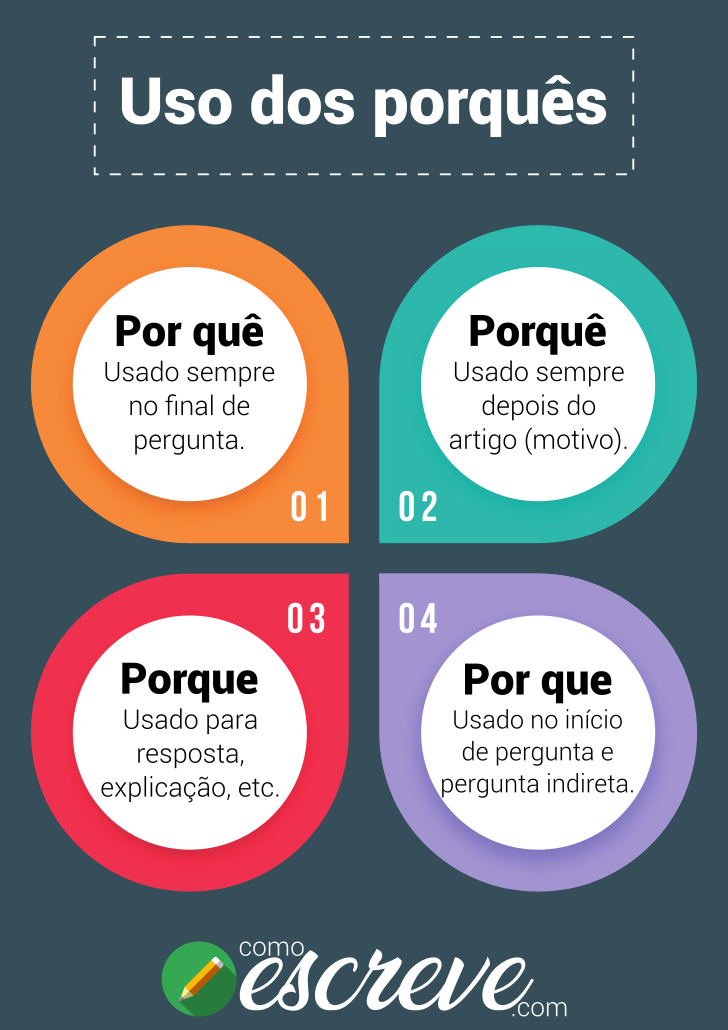Brazilian Portuguese, known for its lyrical flow and nuanced grammar, often throws learners a curveball, especially when it comes to words that look deceptively similar but carry distinct meanings. One such linguistic puzzle is the case of "porque," "por que," "porquê," and "por quê" – four seemingly identical words distinguished only by subtle accents and spacing. Mastering these variations is essential for anyone striving for fluency and grammatical accuracy in Portuguese.
Imagine this: you're engrossed in a captivating Brazilian novel, only to stumble upon a "porquê" where you expected a "porque." The flow is disrupted, and a sense of grammatical uncertainty creeps in. These little words, though small in stature, hold significant weight in the grand scheme of Portuguese sentences.
The reason behind this grammatical quartet lies in the intricate interplay of prepositions, conjunctions, and interrogative pronouns. Each variation plays a unique role in constructing coherent and grammatically sound sentences.
Unraveling the mystery of "uso do porque junto e separado" is akin to acquiring a secret code that unlocks a deeper level of linguistic proficiency. Once mastered, you'll navigate Portuguese sentences with increased confidence and precision, expressing yourself with clarity and nuance.
Throughout this article, we'll delve into the intricacies of "porque," "por que," "porquê," and "por quê," equipping you with the knowledge and tools to confidently wield these words in your own Portuguese conversations and writing. Get ready to conquer this common grammatical hurdle and elevate your Portuguese language skills to new heights!
Understanding the Four Variations
Let's break down each variation with clear explanations and examples:
1. Porque (Because)
This is the most straightforward variation and acts as a conjunction, connecting two clauses where one explains the reason for the other.
Example: Eu gosto de pizza porque é deliciosa. (I like pizza because it's delicious.)
2. Por que (Why)
"Por que" is used in interrogative sentences, essentially asking "why" something is the case.
Example: Por que você está triste? (Why are you sad?)
3. Porquê (The reason)
"Porquê," with an accent mark, functions as a noun meaning "the reason." It's often preceded by the definite article "o" (the).
Example: Não sei o porquê da sua raiva. (I don't know the reason for your anger.)
4. Por quê (Why)
This variation is similar to "por que" but is used at the end of a sentence or when followed by a punctuation mark.
Example: Você está triste por quê? (Why are you sad?)
Mastering "Porque," "Por Que," "Porquê," and "Por Quê": Tips and Tricks
Here are some handy tips to help you remember the distinctions:
- Think of "porque" as a single unit meaning "because."
- Visualize "por que" as two separate words, "for what," when asking "why?"
- Remember that "porquê" with the accent signifies "the reason" and often pairs with "o" (the).
- Use "por quê" at the end of sentences or before punctuation when asking "why."
Conclusion
Mastering the nuances of "porque," "por que," "porquê," and "por quê" is a testament to your dedication to conquering the intricacies of Brazilian Portuguese. While these four variations might initially seem like minor hurdles, understanding their distinct roles unlocks a world of expressive possibilities in your Portuguese communication. Embrace the challenge, practice consistently, and soon you'll be navigating these grammatical waters with the confidence of a native speaker.
Atividade de Português sobre uso do Porque - The Brass Coq
armandinhoporques Portuguese Grammar, Portuguese Lessons, Portuguese - The Brass Coq
Uso dos porquês - The Brass Coq
alguem me diz a regra para usar os porquês?? - The Brass Coq
Atividades de uso do porque para Imprimir - The Brass Coq
Por Que (Porque Se Escribe Separado Y Seguido:v XD - The Brass Coq
Quando usar por que, por quê, porque e porquê - The Brass Coq
Plano De Aula Uso Dos Porques 8 Ano - The Brass Coq
Atividades gramaticais: O uso dos porquês in 2024 - The Brass Coq
Atividade Uso Dos Porques Com Gabarito - The Brass Coq
uso do porque junto e separado - The Brass Coq
Uso dos porquês: entenda a diferença e saiba quando usar porque, porquê - The Brass Coq
uso do porque junto e separado - The Brass Coq
Como Usar O Por Que No Meio Da Frase - The Brass Coq
Texto Com Os Porques - The Brass Coq














